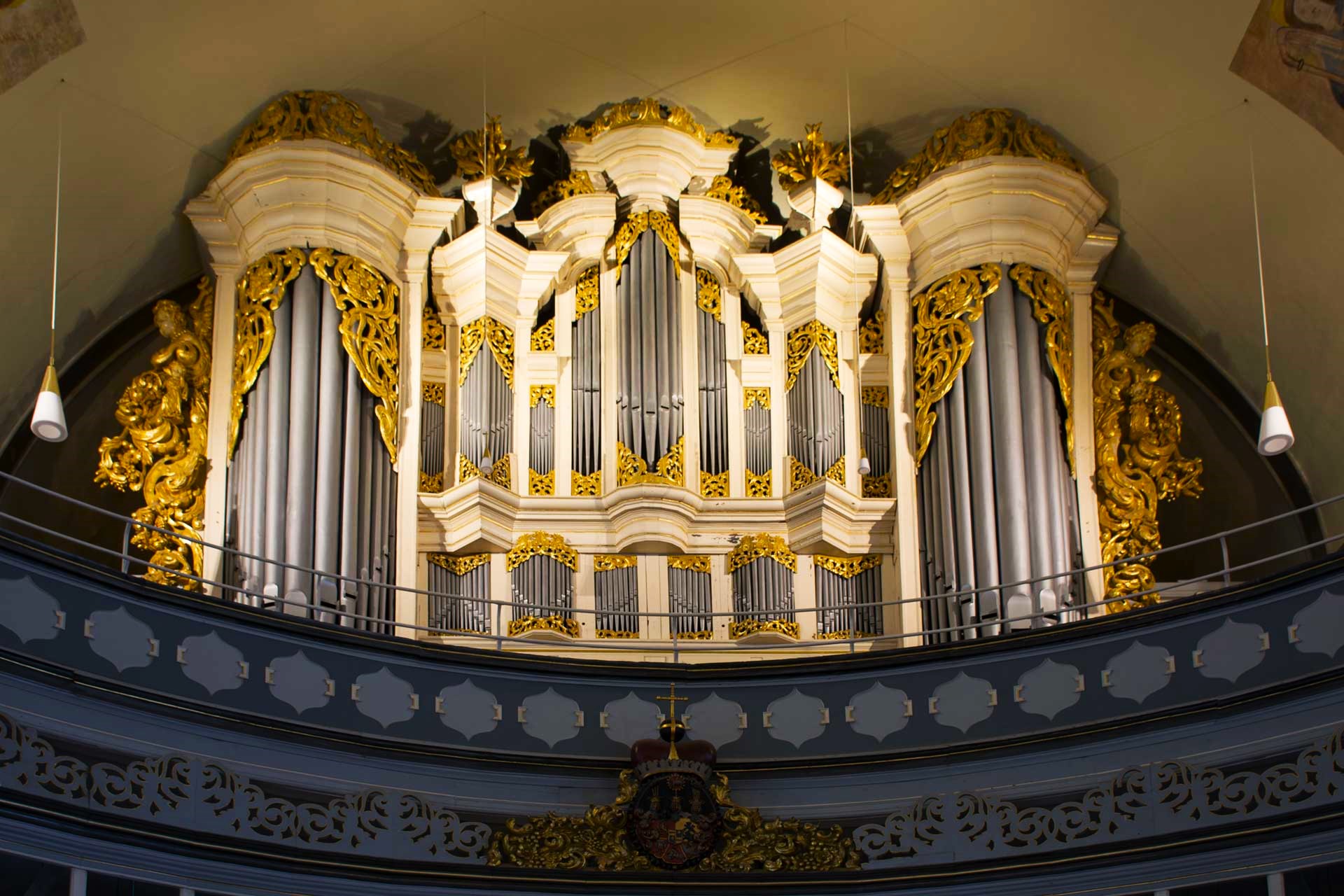Itzehoe, St. Laurentii
| Builder | W. Sauer |
|---|---|
| Year | ca. 1905 |
| Period/Style | Romantic |
| Stops | 50 |
| Keyboards | 5+2P |
| Keyaction | electro-pneumatic |
| Tuning | Equal at 440 Hz |
The largest instrument in the Rantzau-Münsterdorf church district with a colorful history:
In 1716-1719, the famous Arp Schnitger began a new construction in the Stadtkirche Itzehoe; after Schnitger's death in 1719, his master journeyman Lambert Daniel Karstens completed the work.
In 1905, the organ was completely rebuilt by the organ building workshop Sauer / Frankfurt a. d. Oder while retaining the facade with existing baroque pipes, which were now silent.
In 1976, the instrument was electrified and expanded to four manuals by the Hamburg firm Grollmann; in 2000, the so-called facade organ was created by organ builder Heinz Hoffmann, in which the historical Schnitger pipes (Principal 16′ and Principal 8′) sound again - two additional Principal registers were designed according to historical measurements.
As the large work, which is no longer convincing in its overall concept according to today's organ-building standards, increasingly shows vulnerabilities, there are considerations for the long-term reconstruction of one of the predecessor instruments.
In 1716-1719, the famous Arp Schnitger began a new construction in the Stadtkirche Itzehoe; after Schnitger's death in 1719, his master journeyman Lambert Daniel Karstens completed the work.
In 1905, the organ was completely rebuilt by the organ building workshop Sauer / Frankfurt a. d. Oder while retaining the facade with existing baroque pipes, which were now silent.
In 1976, the instrument was electrified and expanded to four manuals by the Hamburg firm Grollmann; in 2000, the so-called facade organ was created by organ builder Heinz Hoffmann, in which the historical Schnitger pipes (Principal 16′ and Principal 8′) sound again - two additional Principal registers were designed according to historical measurements.
As the large work, which is no longer convincing in its overall concept according to today's organ-building standards, increasingly shows vulnerabilities, there are considerations for the long-term reconstruction of one of the predecessor instruments.
| Hauptwerk | Oberwerk | Schwellwerk | Bombardenwerk | Hauptwerk (Schnitger) | Pedal | Pedal (Schnitger) |
|---|---|---|---|---|---|---|
| Principal 16′ | Lieblich Gedackt 16′ | Quintadena 8′ | Bombarde 16′ | Principal 8‘ (histor.) | Principal 16′ | Principal 16’ (histor.) |
| Principal 8′ | Rohrflöte 8′ | Gedackt 8′ | Schweizer Trompete 8′ | Octave 4‘ | Subbaß 16′ | |
| Gemshorn 8′ | Principal 4′ | Principal 4′ | Hautbois 8′ | Octave 2‘ | Quinte 10 2/3′ | |
| Gemshorn-Schw. 8′ | Nachthorn 4′ | Oktave 2′ | Clairon 4′ | Oktave 8′ | ||
| Oktave 4′ | Superoktave 2′ | Kleinflöte 2′ | Cornett V ab f | Gedackt 8′ | ||
| Rohrflöte 4′ | Schweizerpfeife 2′ | Sesquialtera II | Oktave 4′ | |||
| Quinte 2 2/3′ | Rauschpfeife II | Larigot 1 1/3′ + 1′ | Nachthorn 2′ | |||
| Superoctave 2′ | Quinte 1 1/3′ | Mixtur IV 1′ | Choralflöte II 4′ | |||
| Mixtur IV 1 1/3′ | Scharff III 2 2/3′ | Dulcian 16′ | Posaune 16′ | |||
| Scharff III 1/3′ | Ranckett 16′ | Fagott 8′ | Trompete 8′ | |||
| Trompete 8′ |
https://orgellandschaft-kkrm.de/orgeln/itzehoe-laurentii/
 Pipe Organ Map
Pipe Organ Map